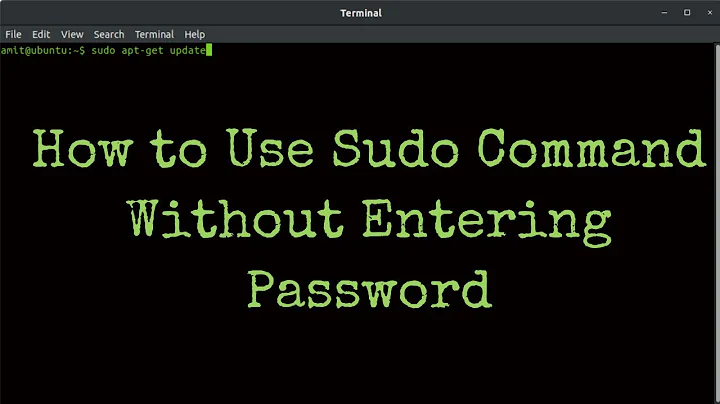pipe password to `sudo` and other data to `sudo`ed command
Solution 1
This will do:
{ echo 'mypassword'; echo 'some text'; } | sudo -k -S tee -a /etc/test.txt &>/dev/null
The point is sudo and tee use the same stdin, so both will read from the same source. We should put "mypassword" + "\n" just before anything we want pass to tee.
Explaining the command:
- The curly braces groups command. We can look at
{...}as one command. Whatever is in{...}writes to the pipe. echo 'mypassword'will write "mypassword\n" to the pipe. This is read bysudolater.echo 'some text'write "some text\n" to the pipe. This is what will reachteeat the end.sudo -k -Sreads password from its stdin, which is the pipe, until it reaches "\n". so "mypassword\n" will be consumed here. The-kswitch is to make suresudoprompt for a password and ignore user's cached credential if it's used recently.teereads from stdin and it gets whatever left in it, "some text\n".
PS: About I/O redirection: Yes you are right, 1>filename is identical to >filename. They both redirect stdout to filename. Also 0<filename and <filename are identical, both redirect stdin.
Solution 2
I couldn't put it in a comment, but note that you can combine the -k option with the already existing sudo command, i.e., instead of using
sudo -k && echo 'some text' | { echo 'mypassword'; cat -; } | sudo -S tee -a /etc/test.txt &>/dev/null
you can directly put the -k in the original sudo. It might even be "safer":
echo 'some text' | { echo 'mypassword'; cat -; } | sudo -k -S tee -a /etc/test.txt &>/dev/null
Solution 3
This is a bit late but I find this to work well:
sudo -k && echo -e "password\ntext" | sudo -S tee file > /dev/null 2>&1
This does not require multiple pipes and is simpler to understand.
> /dev/null 2>&1
This redirects all output including the one asking for password to /dev/null.
Related videos on Youtube
Anthony Webber
Updated on September 18, 2022Comments
-
 Anthony Webber almost 2 years
Anthony Webber almost 2 yearsBoth of these commands work: (note the
-Sinsudotells sudo to read the password from stdin).echo 'mypassword' | sudo -S tee -a /etc/test.txt &> /dev/null echo -e '\nsome\nmore\ntext' | sudo tee -a /etc/test.txt &> /dev/nullNow I would like to combine the two, i.e. achieve everything in just one line. But, of course, something like this doesn't work:
echo -e '\nsome\nmore\ntext' | echo 'mypassword' | sudo -S tee -a /etc/test.txt &> /dev/nullWhat would work? Thanks:) - Loady
PS: Minor unrelated question: is 1> identical to > ? I believe they are..
-
Q23 almost 7 yearsYes, the 1 in 1> is implied.
-
Q23 almost 7 yearsAnd if you want to run everything on one line, can't you just command1 && command2?
-
 Anthony Webber almost 7 years@Q23 echo 'mypassword' | sudo -S && echo -e '\nsome\nmore\ntext' | tee -a /etc/test.txt &> /dev/null doesn't work..
Anthony Webber almost 7 years@Q23 echo 'mypassword' | sudo -S && echo -e '\nsome\nmore\ntext' | tee -a /etc/test.txt &> /dev/null doesn't work.. -
 Martin von Wittich almost 7 yearsThis sounds like an extremely bad idea. What are you trying to accomplish? Why not just add a
Martin von Wittich almost 7 yearsThis sounds like an extremely bad idea. What are you trying to accomplish? Why not just add aNOPASSWDentry to yoursudoersfile? -
 Anthony Webber almost 7 years@Martin I'm trying to direct 'mypassword' to sudo, and \nsome\nmore\ntext to tee
Anthony Webber almost 7 years@Martin I'm trying to direct 'mypassword' to sudo, and \nsome\nmore\ntext to tee -
 Martin von Wittich almost 7 years@AnthonyWebber yes, that I understood, but why? Do you need call
Martin von Wittich almost 7 years@AnthonyWebber yes, that I understood, but why? Do you need callsudofrom a script or a cronjob or something, so that it has to run non-interactively? Then theNOPASSWDoption is probably far safer and less complicated than putting the password into a script and trying to pipe it intosudo.
-
-
Navid Ht about 4 yearsI edited my answer, thanks.
-
 Diego Bandeira over 2 yearsThis way the password could be seen by another user that runs
Diego Bandeira over 2 yearsThis way the password could be seen by another user that runsps aux. Is that correct? In this same direction, this onelinerecho "some text" | sudo -k -S <<< $PASSWORD tee /etc/test.txtwould work, or does it falls into the same problem of having only one STDIN? -
Navid Ht over 2 years@DiegoBandeira I tested your suggestion using here strings. The answer is yes and no! It doesn't work in bash, as I expected, but works in zsh.




